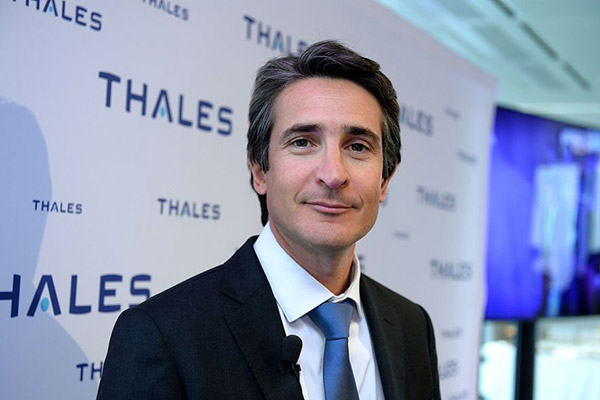By Pierre Tran
Paris – There has been little interest in big consolidation moves in the European defense industry, with the creation of EADS the last time there was a major merger, said Thales executive chairman Patrice Caine.
The European Aeronautics Defence and Space company, the previous name for Airbus, was formed 20 years ago, and since then there have been small steps with the creation of joint ventures, he told Oct. 23 the Anglo-American Press Association.
Nexter and KMW have formed a JV in land weapons, while Naval Group and Fincantieri have partnered in a naval JV, he said.
There is also a German naval joint venture being set up by Lürssen and German Naval Yards, seen as a defensive move following Berlin’s pick of Damen, a Dutch shipbuilder, to build four MKS 180 warships.
Thales is partner with Damen on that German frigate deal, worth €4.6 billion ($5.4 billion), which includes an option for two more units. That German contract is expected to boost Thales’s orders in the fourth quarter, chief financial officer Pascal Bouchiat said Oct. 22, Reuters reported.
Apart from those joint ventures, there has not been a large scale consolidation move since the French, German and Spanish creation of EADS in response to a British mega-merger between BAE and GEC, an electronics company.
Consolidation moves have created large companies such as Airbus, BAE, Thales and Leonardo, with little scope for further deals, he said.
Thales holds 67 percent of a Franco-Italian satellite builder Thales Alenia Space, which competes directly with the Airbus space division. Calls for a rationalization in that sector have failed to deliver a merger.
Thales holds 35 percent of Naval Group (NG), with little sign of increasing that shareholding.
Asked about NG and Thales on their rival offers of naval combat systems, Caine said there was no competition between the two companies, as the former built ships and submarines, while the latter supplied electronics such as radar, sonar and electronic warfare systems.
NG describes itself as warship designer, builder and integrator, as well as providing service support and dismantling retired warships and submarines.
Caine said he sat on the board of directors of Naval Group when asked whether he talked often to Pierre Eric Pommellet, who became executive chairman of NG in April. Pommellet was a senior Thales executive before taking up the top job at NG.
France holds 62.25 percent of NG, with staff 1.88 percent, and Thales holding the rest.
The government holds 25.7 percent of Thales, with Dassault Aviation the second-largest shareholder with 24.6 percent. Staff hold 2.8 percent, with the rest traded on the stock market.
Thales sells naval combat management systems which are “platform neutral,” competing with NG in world markets for warships.
The electronics company teamed with Belgian and French partners Engine Deck Repair, Chantiers de l’Atlantique, and Socarenam, to form the Sea Naval Solutions consortium in the Belgian-Dutch tender for 12 mine hunters.
NG won that competition with its partner ECA in a JV dubbed Belgium Naval & Robotics.
Thales promoted its unmanned system for mine countermeasures during the virtual Euronaval trade show, publishing pictures of the naval system, which had completed one and a half months of sea trials. That autonomous underwater system is due to equip mine countermeasure systems for the British and French navies.
Euronaval closed on Oct. 22.
Thales will supply subsystems on the prospective French next generation aircraft carrier, but its share of the value will be less than on frigates, as the carrier will be much larger than the frigates, he said.
Greece appeared to have dropped plans to order two French frigates for defense and intervention (FDI), but the Greek market was not seen as a lost cause as Athens has said there were plans to order 18 Rafale fighter jets.
Six of those fighters will be new, while the remaining 12 will be second hand from the French air force. Thales supplies the active electronically scanned array radar and other electronics, accounting for some 25 percent of the value of the Rafale.
On the planned launch of a European Defense Fund (EDF), it was positive there will be backing from the European Union — even if it will be reduced — when previously there was none, he said.
“It’s good news,” he said.
The EU EDF is due to be launched with €8 billion of backing for research and development, compared to a previous plan of €13 billion.
Thales’s subsidiary in the UK is focused on the British market and exports mainly outside the EU, he said.
Asked about the UK prospects after Brexit, he said, “Anyone got a crystal ball?”
Featured Photo: Patrice Caine, chairman and CEO of Thales Group. [Photo/VCG]


